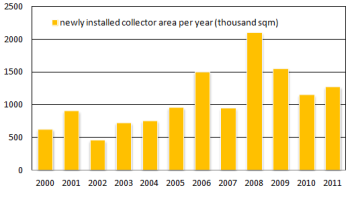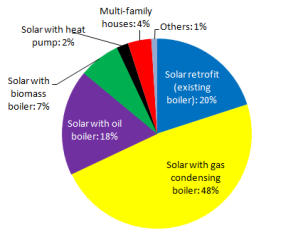Germany: “Solar Thermal Business might have a Structural Problem”
March 5, 2012
 2011 was a better year for the German solar thermal industry than 2010, but it still has been far from a good one: Compared to the so far best year, 2008, the collector area installed in 2011 was around 40% less, although figures are still 10 % above the previous year 2010. German’s solar and heating industry associations name different reasons for the dissatisfying market development in the last three years.
2011 was a better year for the German solar thermal industry than 2010, but it still has been far from a good one: Compared to the so far best year, 2008, the collector area installed in 2011 was around 40% less, although figures are still 10 % above the previous year 2010. German’s solar and heating industry associations name different reasons for the dissatisfying market development in the last three years.
Source: BSW-Solar, BDH
After two years of a declining solar thermal market, Germany’s industry could finally proclaim growth for 2011. Solar collectors with a total capacity of 890 MWth /1.27 million m2 were newly installed in Germany in 2011, which is 10 % more than in 2010 (810 MWth / 1.15 million m2). But 2011 was a tough year for many solar thermal companies: Numbers turned out positive only at the very end of the year. As prospects had still seemed grim in summer, some companies have already chosen to dismiss employees during the year. Monthly statistics of associations BSW Solar and BDH from the end of July 2011 showed a cumulated sales volume that was still 2 % below the same period in 2010. The unusual increase in new installations in December could have partly been a result of the previously announced change in federal incentives for solar thermal. On 1 January 2012, they have dropped from 120 to 90 €/m2.
Despite the growth in new installations, the relief is not as great as it may seem at first. Total new installations in 2011 were still lagging 40 % behind the numbers of 2008, which saw a newly installed collector area of 2.1 million m2 – the most successful year ever for the German solar thermal industry.
One can easily make out two reasons for why the market development was so slow: Certainly, sales correlate with the oil price, which was high in 2008, lower in 2009 and 2010, and is now rising again rapidly. Second, most industry specialists seem to also agree that photovoltaics compete with solar thermal for the customer’s limited budget and limited roof area. A remunerative feed-in tariff and low module costs made PV especially attractive in 2011. This feed-in tariff will be lowered significantly in 2012, which makes competition less likely. Because of those two factors, German’s solar thermal sector is thought to do better in 2012.
The role of other factors is more difficult to assess. According to a survey among installers that was carried out by German trend research agency Querschießer, solar thermal was not economically rewarding for the residential client. In the same survey, however, installers confirm that solar thermal meant good business for themselves. “It looks as if current pricing and rebate conditions are beneficial to installers, but not to customers,” the Querschießer analysts write. Because three-tiered distribution is the most common in Germany, installers play an important role. German Consulting Engineer Dietmar Lange says: “Solar thermal business in Germany might have a structural problem.”
He criticises the way in which the solar thermal industry and German’s solar industry association BSW Solar present the economics of solar thermal systems – and market data in general – to the public. For example, BSW Solar shows newly installed solar collectors in square meter collector area. When it comes to the economics of a solar system, BSW Solar indicates price development of solar thermal, oil and natural gas systems. According to Lange, this is not what a consumer would need. “The heating industry association BDH has seen solar thermal systems as a component of modern heating systems for quite some time and made this fact clear in public relations,” Lange says. Consequently, BDH statistics show the share of newly installed heating systems including solar thermal in numbers. This figure reached its maximum during the solar thermal boom in 2008 with a share of 45 %. In 2010, it was down to 23 % and slightly recovered to 25 % in 2011. As for economics of heating systems, heating industry organisations such as Initiative Erdgas pro Umwelt (Natural Gas for the Environment Initiative) compare the payback time of various heating systems with and without solar. Which would be the correct way to present solar thermal economics to customers has been subject to an intense debate across the German solar thermal and heating industry for years.
More information:
BSW Solar: http://www.solarwirtschaft.de/en/start/english-news/
Heating association BDH: bdh-koeln.de/en/der-bdh.html


